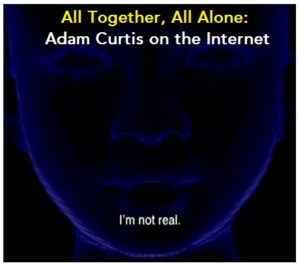All Together, All Alone: Adam Curtis on The Internet
Late last year, British journalist and documentarian Adam Curtis released ‘Hypernormalization’ 1, his 2 hour 46 minute magnum opus that attempts to give perspective to the confusing times we live in. One of the running threads through this sprawling film was the story of the internet told like we’ve never heard it before.
Instead of the same old story of ‘innovation and discovery’, Curtis uses an older framework of ‘power and politics’. And in doing so, he shines a fleeting light on this massive network that is the world wide web.
And like the websites say… what you will see, will blow your mind.
Throughout the documentary, Curtis argues, even raves, against the simplification of any complex scenario – be it politics or media or culture, which he strongly feels is causing the world to lose sight of what is real and what is not. But in culling out relevant portions of his magnificent movie, we hope to present a unique and urgent point-of-view not just of the internet, but of our near future.
Part 1: Invisible Systems
Are we using the Internet or is the Internet using us?
As nations and a species, we are now constantly gearing up towards a digital future. In fact, we cheer it along. The digital future seems to pulse with radical promises of never-before-experienced ease, opportunity and equality. But occasionally, we do get the feeling, that the digital is not all rosy as it is made out to be.
We get the feeling that it is not we using the internet, but that it is the internet that is using us. Is the internet the public space that it is made out to be, or is it controlled by powerful corporations? Who profits more from your activities online?
Part 2: Pattern Recognition
How real is the virtual world?
We use the Internet to present ourselves the way we want to be perceived by the world. Our own social media profiles are simplified, almost cartoon versions of the people we actually are. But we spend a large amount of time everyday reacting to these borderline unreal approximations.
People are quick to label ‘porn’ as being unreal, but what about the rest of the internet? How real is it? How much of this unreality is shaping our reality?
Part 3: Together, With Nowhere to Go
One of the most common labels that people seem to tack on to the internet is that it is ‘an agent of change’. But what is this ‘change’ that the internet is leading us into? Who defines this ‘change’ on the internet? Is it you or is it someone much more powerful than you?
Also, is the internet really a ‘level playing ground without hierarchies’. You can tweet at prime ministers, maybe even abuse them, but does the internet make you ‘equal’ to them?
Part 4: Through the Mirror, Darkly
The internet is run on algorithms, automated operations who among other things track your likes and dislikes, and try to make our online experience a pleasurable one by ensuring that we get more of what we like and less of what we don’t. The web draws us in because it is mesmerizing. It is a place where we explore and get lost in; we can go anywhere we want to go.
Is this approach moving us into an isolated bubble with each of us at its center? Is it cutting us away from other points of view? Is it putting blinkers on our eyes and making our world less tolerant and diverse? Is it making our reality a cartoon?
Adam Curtis’ Hypernormalization in its 2hour46minutes glorious entirety and all its disturbing complexity can be found at this link.
—————————————–
- The term “hypernormalisation” is taken from Alexei Yurchak’s 2006 book Everything was Forever, Until it was No More: The Last Soviet Generation, about the paradoxes of life in the Soviet Union during the 20 years before it collapsed A professor of anthropology at the University of California, Berkeley, he argues that everyone knew the system was failing, but as no one could imagine any alternative to the status quo, politicians and citizens were resigned to maintaining a pretence of a functioning society. Over time, this delusion became a self-fulfilling prophecy and the “fakeness” was accepted by everyone as real, an effect which Yurchak termed “hypernormalisation”








